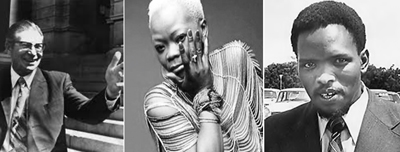Latest News Archive
Please select Category, Year, and then Month to display items
11 February 2022
|
Story Leonie Bolleurs and Rulanzen Martin
![]()

After two years of lockdown, online meetings, and limited contact with colleagues, academy at the University of the Free State (UFS) is gradually returning to normal. This month (February 2022), staff, students, and members of related industries will convene on three different occasions to learn about cutting-edge scholarship, to reconnect with each other, and to discuss issues impacting society in the fields of theology, the humanities, and agriculture.
Seminar on ‘The Limits of Decolonisation’ with Prof RW Johnson
Date: 24 February 2022
Time: 09:00-16:00 SAST
Venue/Platform: Equitas Auditorium, UFS Bloemfontein Campus, and Microsoft Teams
Decolonisation has been a heated point of discussion for some time now, but have you ever wondered if there could be limitations hindering the decolonisation project? The Departments of Political Studies and Governance and Philosophy and Classics at the UFS will host an array of academics and experts for a hybrid seminar on the topic The Limits of Decolonisation.
If decolonisation is an important issue for you or if you are interested in the topic and its relevance and influence in the world and academia, you should join or attend the seminar – either online via Microsoft Teams or in person in the Equitas Auditorium – on 24 February 2022 from 09:00.
The keynote speaker is political scientist
Prof RW Johnson from the University of Oxford. Prof Johnson is an emeritus fellow at Magdalen College and is the author of several acclaimed political books. The other speakers are all from the Departments of Political Studies and Governance, and Philosophy and Classics. Terrence Corrigan from the
South African Institute of Race Relations will speak on The relationship between critical race theory and decolonisation.
RSVP: Alice Stander StanderAFM@ufs.ac.za (please specify dietary requirements, as a light lunch will be served)

Understanding the nature of prominence
2014-03-14
|
 |
What did Hendrik Verwoerd and Steve Biko have in common? Or perhaps Johannes Kerkorrel and Brenda Fassie?
“They all possessed a certain natural predisposition to prominence,” says Prof Paul Fouche, reseacher in psychobiography at the University of the Free State’s Department of Psychology.
Prof Fouche and a team of researchers from other South African universities released findings on psychobiographical studies done on personalities that played a great role in our history.
The studies show that notable historical figures were very often prolific readers with a passion for literature since childhood. Generally, they also had a great love for nature and a sense of the sacredness of it, as well as a love for the cosmos.
The study further reveals that many of them were forced to take up leadership roles in the family from a very young age and were driven to succeed in order to take care of their own.
In many of these cases, there was a strong partner who supported the leader while they went about the business of governing their world.
Psychobiography is the systematic and descriptively-rich case study of renowned, enigmatic or even contentious individuals in socio-historical contexts within a psychological frame of reference. Over the past decade, psychobiography has become an established research genre and a methodology used by various academics and scholars in the field of life history research.